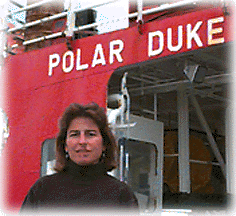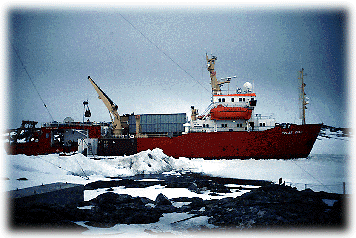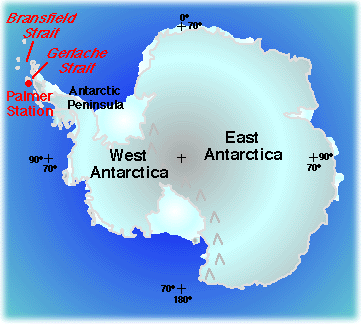
|
|





mbrumsted@chelsea.mec.edu
See Margaret's Expedition Pictures!

Hello! I am Margaret Brumsted and I live in Providence, Rhode Island
where I enjoy the beautiful beaches and coastline! I am on a years leave
of absence from my regular teaching position at Dartmouth High School, Dartmouth
,
Massachusetts, where I have taught marine science and horticulture for the
past twelve years. This year I am working as a science resource specialist
in the Chelsea School System, Chelsea, Massachusetts. This position offers
me the opportunity and flexibility to reach students at all levels (K-12)
in both communities, Chelsea and Dartmouth. These students will parcticipate
with me in this Antarctic adventure!
 My project is funded by the National Science Foundation through a grant
to me at the University of West Florida. I have collaborators from Oklahoma
State University and the MD Anderson Cancer Center. The project involves
a research cruise aboard the Research Vessel Polar Duke. The ship
is owned by a Norwegian company and licensed to the United States Antarctic
Program. It is approximately 220 feet long. We depart Punta Arenas, Chile
on 24 September and return approximately 3 November. We will be working
along the Antarctic Peninsula in a region called the Gerlache Straits. My project is funded by the National Science Foundation through a grant
to me at the University of West Florida. I have collaborators from Oklahoma
State University and the MD Anderson Cancer Center. The project involves
a research cruise aboard the Research Vessel Polar Duke. The ship
is owned by a Norwegian company and licensed to the United States Antarctic
Program. It is approximately 220 feet long. We depart Punta Arenas, Chile
on 24 September and return approximately 3 November. We will be working
along the Antarctic Peninsula in a region called the Gerlache Straits.

Ultraviolet Radiation Induced DNA Damage in Bacterioplankton in the Southern
Ocean
Investigator: Wade H Jeffrey
University of West Florida
The project I was involved in focused on the affects of ultraviolet radiation on the Antarctic ecosystem. The research team is looking at very small but very important components of the marine ecosystem - bacteria! These microorganisms play a vital role in the marine food web. They are involved in the cycling of dissolved nutrients in sea water. The bacteria take nutrients from the water as they grow and release nutrients back to the water as they decompose after they die. They also help decompose other, larger organisms. This process of decomposition releases biologically important elements back into the water for use by living organisms. Another important role for bacteria is as a food source for other organisms.
Antarctica and the Southern Ocean are receiving higher levels of ultraviolet radiation because of decreasing concentrations of ozone in the atmosphere. Stratospheric ozone absorbs ultraviolet radiation, keeping it from reaching Earth's surface. Antarctic ozone levels have declined as much as 74 percent due to increased amounts of certain chemicals we have released into the atmosphere.
The research team I was a part of is interested in how increased ultraviolet radiation levels affect marine bacteria. In just a teaspoon of seawater there are millions of these microorganisms! Many people think that all bacteria are bad, but that is not the case - they carry out processes essential to the health of the marine ecosystem. Along with phytoplankton (tiny aquatic plants), bacteria form the base of the oceanic food chain.
My team worked aboard the Research Vessel Polar Duke in the Bransfield Strait area. We collected samples to determine to what degree the marine bacteria have been damaged by increased ultraviolet radiation, and whether they are developing protective measures. If the bacteria are being stressed by increased radiation levels, their growth rate may slow, decreasing the amount of food available to organisms higher up the food chain. This effect can potentially propagate throughout the ecosystem. We need to understand how the bacteria are faring so we can predict consequences to the Antarctic marine ecosystem with continued changes in the environment.

Margaret
will be collecting samples from the waterways around the Antarctic
Peninsula.
Personnel include:
Dr. Wade Jeffrey, Principal Investigator, Faculty Member, University of
West Florida, Center for Environmental Diagnostics and Bioremediation
Erin McKee, Project Director
Melissa Booth, Graduate Student, Oklahoma State University
Margaret Brumsted; High School Teacher, Providence, RI
LeAnna Hutchinson, Graduate Student, University of West Florida
Jason Kase, Graduate Student, University of West Florida
Dean Pakulski, Post Doctoral Fellow, EPA Gulf Breeze Laboratory
Steve Ripp, Graduate Student, Oklahoma State University

November 1996
| Su |
Mo |
Tu |
We |
Th |
Fr |
Sa |
| -- |
-- |
-- |
-- |
-- |
1 |
2 |
| 3 |
4 |
5 |
6 |
7 |
8 |
9 |
| 10 |
11 |
12 |
13 |
14 |
15 |
16 |
| 17 |
18 |
19 |
20 |
21 |
22 |
23 |
| 24 |
25 |
26 |
27 |
28 |
29 |
30 |
October 1996
Return to top of page
|






